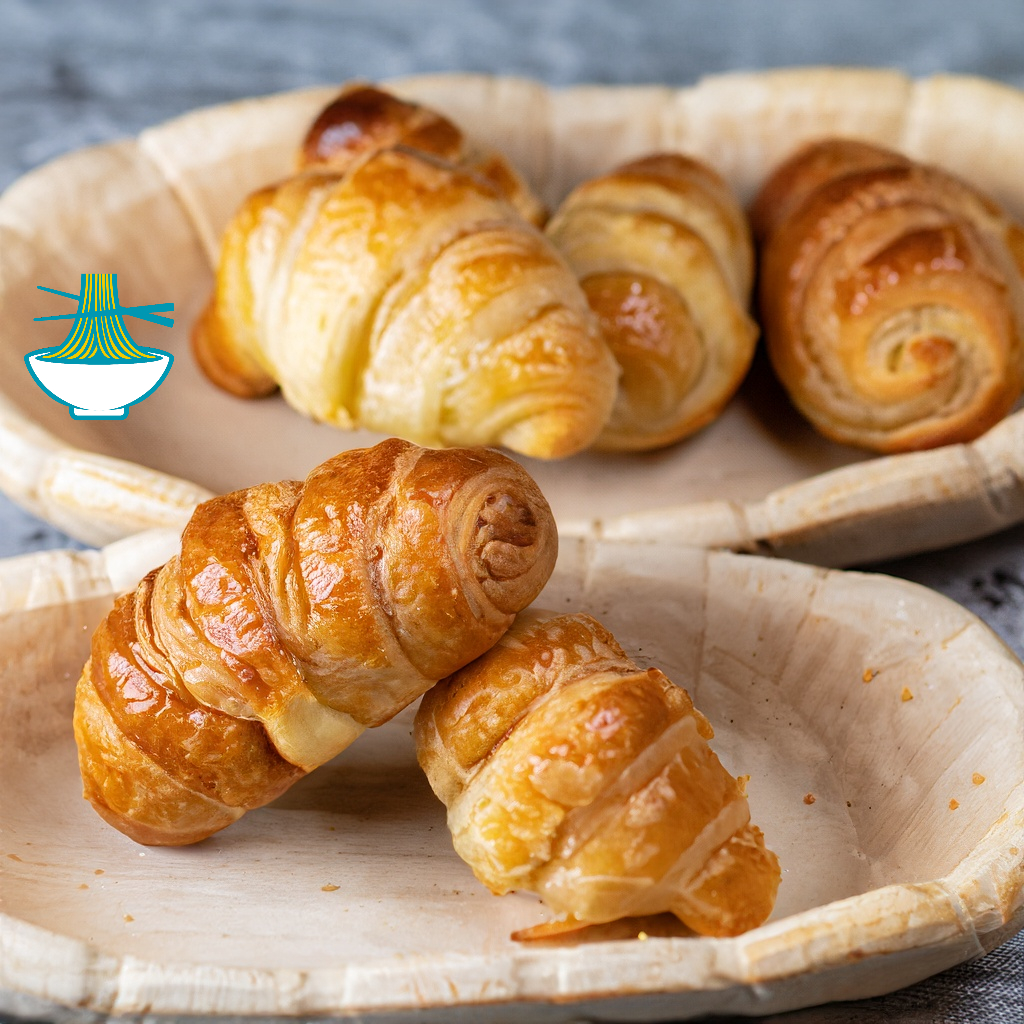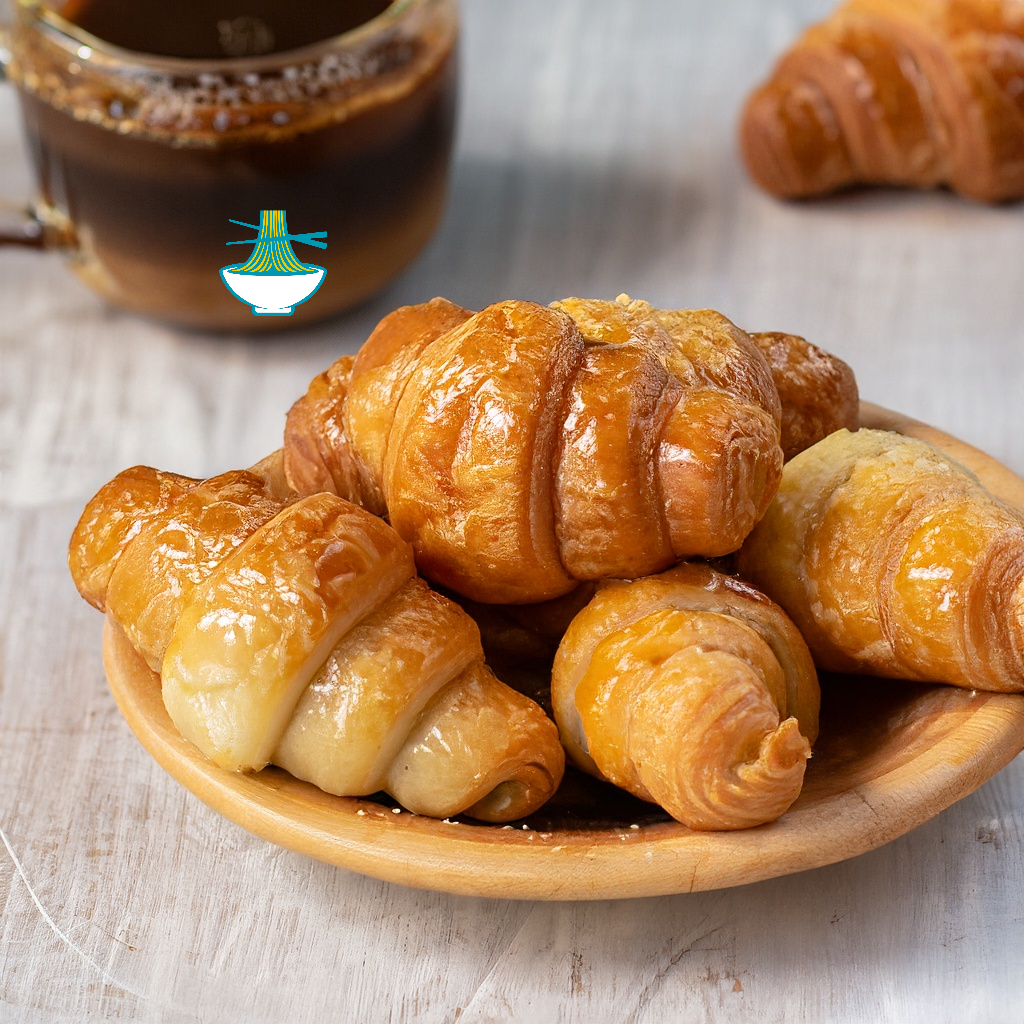Argentine Medialunas are a beloved pastry in Argentina and other South American countries, known for their delicate, flaky texture and sweet, buttery flavor. Similar to croissants, they are often enjoyed at breakfast or as a snack, typically paired with coffee or tea. Medialunas are made through a lamination process, where dough is folded multiple times with layers of butter or margarine, creating their light and airy interior. They come in two main varieties: medialunas de manteca (made with butter) and medialunas de grasa (made with margarine). While both are popular, medialunas de manteca are considered superior for their richer flavor and finer texture.
Medialunas provide important nutrients, including healthy fats from butter and margarine, offering a source of energy. However, they are high in calories and fats, so moderation is key to avoid excessive weight gain. Additionally, their sweetness comes from sugar, which can contribute to blood sugar spikes if consumed in large quantities. Enjoyed in moderation, medialunas can be a delightful and indulgent part of a balanced diet, offering both a satisfying taste and a small boost of energy.
ingredients:
1- 500g all-purpose flour
2- 7g instant yeast
3- 50g sugar
4- 8g salt
5- 100g unsalted butter, at room temperature
6- 200ml whole milk
7- 1 egg yolk
Method:
Step 1: In a large bowl, combine the flour, yeast, sugar, and salt. Mix well.
Step 2: Add the butter to the bowl and use your fingers to incorporate it into the flour mixture until it resembles coarse sand.
Step 3: In a small saucepan, warm the milk over low heat until it reaches about 40°C.
Step 4: Add the milk to the flour mixture and mix until a shaggy dough forms.
Step 5: Turn the dough out onto a floured surface and knead for 10 minutes until it becomes smooth and elastic.
Step 6: Place the dough in a greased bowl and cover it with a towel. Let it rise for 1 hour in a warm, draft-free place.
Step 7: Punch down the dough and turn it out onto a floured surface. Roll it out into a large rectangle.
Step 8: Cut the dough into triangles, then roll each triangle from the wide end to the point.
Step 9: Place the medialunas on a baking sheet lined with parchment paper and let them rise for another 30 minutes.
Step 10: Preheat your oven to 180°C. Brush the medialunas with the egg yolk and bake them for 15-20 minutes, or until golden brown.
Note:
- Medialunas can be made with butter or margarine. The type of fat used will affect the flavor and texture of the pastry.
- Cholesterol and Heart Health: The high content of butter and margarine, especially in Medialunas de grasa, can lead to increased levels of saturated fats and cholesterol in the blood. This can contribute to heart disease and high blood pressure if consumed in excess.
- Weight Gain: Medialunas are calorie-dense due to their sugar and fat content. If consumed frequently and in large portions, they can contribute to an increase in body fat, especially if not balanced with physical activity.
- Blood Sugar Levels: The sugar and refined flour in Medialunas can cause blood sugar spikes, which can be harmful to those with diabetes or insulin resistance.
Additional Suggestions
- Add a touch of sweetness by filling the medialunas with chocolate, dulce de leche, or fruit jam.
- You can also top them with powdered sugar or cinnamon for extra flavor.
- For those who prefer a savory snack, try filling them with cheese, ham, or even vegetables like spinach or mushrooms.
- Add crushed nuts such as almonds, hazelnuts, or walnuts to the dough for a crunchy texture and extra flavor.
- Gluten-Free Options: For individuals with gluten intolerance, you can substitute regular flour with gluten-free flour blends, ensuring that Medialunas remain enjoyable without compromising health.
Frequently Asked Questions
Are Medialunas suitable for people on a diet?
- Medialunas are calorie-dense due to their fat and sugar content. While they can be included in a diet, it’s best to enjoy them in moderation. To fit them into a balanced diet, consider having one Medialuna with a low-calorie beverage like black coffee or herbal tea.
Can the ingredients in Medialunas be substituted for healthier options?
- Yes! You can replace butter with plant-based oils or margarine, which are lower in saturated fats. Use less sugar or replace it with natural sweeteners like honey or maple syrup. For a lighter version, opt for low-fat or plant-based milk and egg whites instead of whole eggs.
How many calories are in one Medialuna?
- A typical 50g Medialuna contains approximately 220 calories, with 10g of fat and 5g of sugar. If you are watching your calorie intake, consider enjoying smaller portions or making a lighter version with reduced sugar and fat.

Nutrition Facts:
1. 500g All-Purpose Flour
- Calories: 1800 kcal
- Carbohydrates: 375g
- Protein: 50g
- Fat: 2g
- Sodium: 0mg
- Cholesterol: 0mg
- Vitamins: Small amounts of B-vitamins (B1, B2, B3, folate)
- Minerals: Small amounts of iron and magnesium
- Nutritional Benefit:
- Primary source of energy (carbohydrates)
- Essential for muscle repair (protein)
- Vital for oxygen transport (iron)
2. 7g Instant Yeast
- Calories: 20 kcal
- Carbohydrates: 3g
- Protein: 2g
- Fat: 0g
- Sodium: 0mg
- Cholesterol: 0mg
- Vitamins: Rich in B-vitamins (B6, B12)
- Minerals: Small amounts of zinc, potassium, magnesium
- Nutritional Benefit:
- Supports metabolism and energy production (B-vitamins)
- Contributes to growth and repair (protein)
- Supports cell function (minerals)
3. 50g Sugar
- Calories: 200 kcal
- Carbohydrates: 50g
- Protein: 0g
- Fat: 0g
- Sodium: 0mg
- Cholesterol: 0mg
- Vitamins: None
- Minerals: None
- Nutritional Benefit:
- Quick source of energy (carbohydrates)
- Contributes to sweetness and texture
4. 8g Salt
- Calories: 0 kcal
- Carbohydrates: 0g
- Protein: 0g
- Fat: 0g
- Sodium: 320mg
- Cholesterol: 0mg
- Vitamins: None
- Minerals: Sodium, chloride
- Nutritional Benefit:
- Essential for fluid balance, nerve function, and muscle contraction (sodium)
- Maintains blood pressure and cellular function (minerals)
5. 100g Unsalted Butter (at room temperature)
- Calories: 720 kcal
- Carbohydrates: 0.6g
- Protein: 0.8g
- Fat: 82g
- Sodium: 0mg (varies by brand)
- Cholesterol: 245mg
- Vitamins: Fat-soluble vitamins A, D, E, K
- Minerals: Small amounts of calcium, phosphorus
- Nutritional Benefit:
- Provides omega-3 and omega-6 fatty acids (healthy fats)
- Supports skin health, vision, and immune function (vitamins A, D)
- Contributes to cell membrane structure (cholesterol)
6. 200ml Whole Milk
- Calories: 140 kcal
- Carbohydrates: 10g
- Protein: 7g
- Fat: 8g
- Sodium: 90mg
- Cholesterol: 30mg
- Vitamins: Vitamin A, Vitamin D, Vitamin B12
- Minerals: Calcium, potassium, magnesium
- Nutritional Benefit:
- Helps in muscle repair and immune function (protein)
- Essential for bone health and strong teeth (calcium)
- Supports vision, skin, and immune system (vitamins)
7. 1 Egg Yolk
- Calories: 55 kcal
- Carbohydrates: 0.6g
- Protein: 2.7g
- Fat: 4.8g
- Sodium: 55mg
- Cholesterol: 184mg
- Vitamins: Rich in Vitamins A, D, E, K
- Minerals: Iron, calcium, phosphorus
- Nutritional Benefit:
- Contributes to tissue repair and enzyme function (protein)
- Provides energy and satiety (healthy fats)
- Supports eye health, immune function, and bone health (vitamins)


Comments